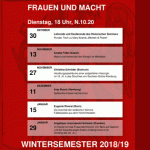 g19 – 2019 conference for gender studies (Web)
g19 – 2019 conference for gender studies (Web)
Venue: Gothenburg
Time: 7-9 October 2019
Proposals by: January 7, 2019
The g19 conference seeks to bring together the broad and interdisciplinary field that constitutes gender studies in Sweden today. It addresses the current societal challenges at both local and global levels and enquires about how gender studies can contribute to analysing the major events in the contemporary world.
The g-conferences is arranged every other year by the Swedish Secretariat for Gender Research, in collaboration with different universities in Sweden. g19 – Knowledge Regimes: Solidarities and Contestations – is arranged in Gothenburg 7-9 October 2019, and gathers the entire interdisciplinary field of gender studies in Sweden. The conference will stimulate cooperation among gender researchers from various academic disciplines and targets scholars, students, practitioners and activists. The aim of the conference is to facilitate critical investigation, sharing of experiences and to inspire to the formation of new ideas and research constellations. Read more … (PDF)




